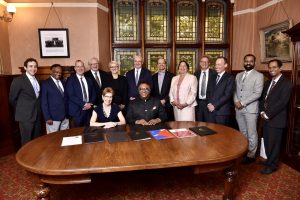Jindal Global University (JGU) hosted a book launch and a panel discussion on ‘The Purveyors of Destiny: A Cultural Biography of the Indian Railways’, at the India International Centre.
The book, authored by Prof (Dr) Arup K. Chatterjee, Assistant Professor Jindal Global Law School, JGU, is a cultural biography of the Great Indian Railways. It is replete with anecdotes from colonial and Indian accounts, the battlefronts of the Indian nationalist movement, Indian cinema, advertisements, and much more. It brings together cultural representations of the railways and how from Rudyard Kipling to Mark Twain, from R.K. Narayan to Ruskin Bond, the aura of Indian trains and railway stations have enchanted many, including cinema fans considering how often the railways have featured in Indian films.
The book was released by Mr Shakti Sinha, Director, Nehru Memorial Museum and Library and followed by a panel discussion – a critical exchange between authors and academicians on the growth of the Indian Railways and its depiction in literature, films and other artistic and representational media.
Professor (Dr) C Raj Kumar, Vice Chancellor, O P Jindal Global University congratulating the author on his maiden work said, “I hope it will inspire others to think how big institutions like the Railways influence societies in a larger context, beyond economics.” Pointing out that Jindal Global University is deeply committed to research, Dr Raj Kumar added, “We, at Jindal, strive to create an intellectual environment. This book is the 16th independently published book by a Jindal faculty member. We recognize the importance of the study of humanities and social sciences. It is gratifying to see this work being put in the public domain, in an institutional context.”
In his congratulatory video message, Union Railway Minister, Suresh Prabhu said, “I am a booklover and I am extremely happy with ‘The Purveyors of Destiny, A Cultural Biography of the Indian Railways’. I would like to congratulate the author for this great work of scholarship and the Vice Chancellor for promoting this kind of meaningful research. O P Jindal University has a talented faculty from whom we ought to benefit.”
Delivering the Guest of Honour address, Mr Shakti Sinha, Director, Nehru Memorial Museum and Library, said “The book gives us an insight into what the Railways represented at different times, and how the institution has been represented in different mediums. To begin with, the Railways represented imperial hierarchies and its penetration into India. Today, trains have percolated deep into the national psyche, and are a part of our identity as a nation. What is a matter of pride for us is that no other country uses train as much as we do. The Indian Railways, in a sense, binds us together, culturally, socially, and economically.”
Introducing the book, the author Prof (Dr) Arup K. Chatterjee said, “What began as an imperial project to foster colonial industries, transformed during the freedom struggle into an important symbol of our national movement. Gandhiji changed the way people perceived the Railways. Postcolonial literature, cinema and television further changed the cultural narrative of the Railways.” He also pointed out that the architecture of Indian railway stations is derived from other colonial cultures (such as Britain) and have also lent themselves to some (such as Australia), connecting India with the rest of the world, through a railway narrative. “The book, strives to bring all these aspects together to give the Railways a cultural identity, inasmuch as the cultural memory and the industry of representations of the railways themselves have been the longest serving industry to the railways,” he said.
The interdisciplinary panel provided an in-depth discussion on Karl Marx’ prediction that the Indian Railways would foster the growth of parallel industries not immediately connected with it. The panellists included Prof (Dr) Arup K. Chatterjee; Ms. Himanjali Sankar, Publisher/Editor, Bloomsbury & Author, Talking of Muskaan; Prof (Dr) Amit Ranjan, Assistant Professor, Zakir Husain Delhi College, University of Delhi; Mr Manu S Pillai, Author, The Ivory Throne: Chronicles of the House of Travancore.


